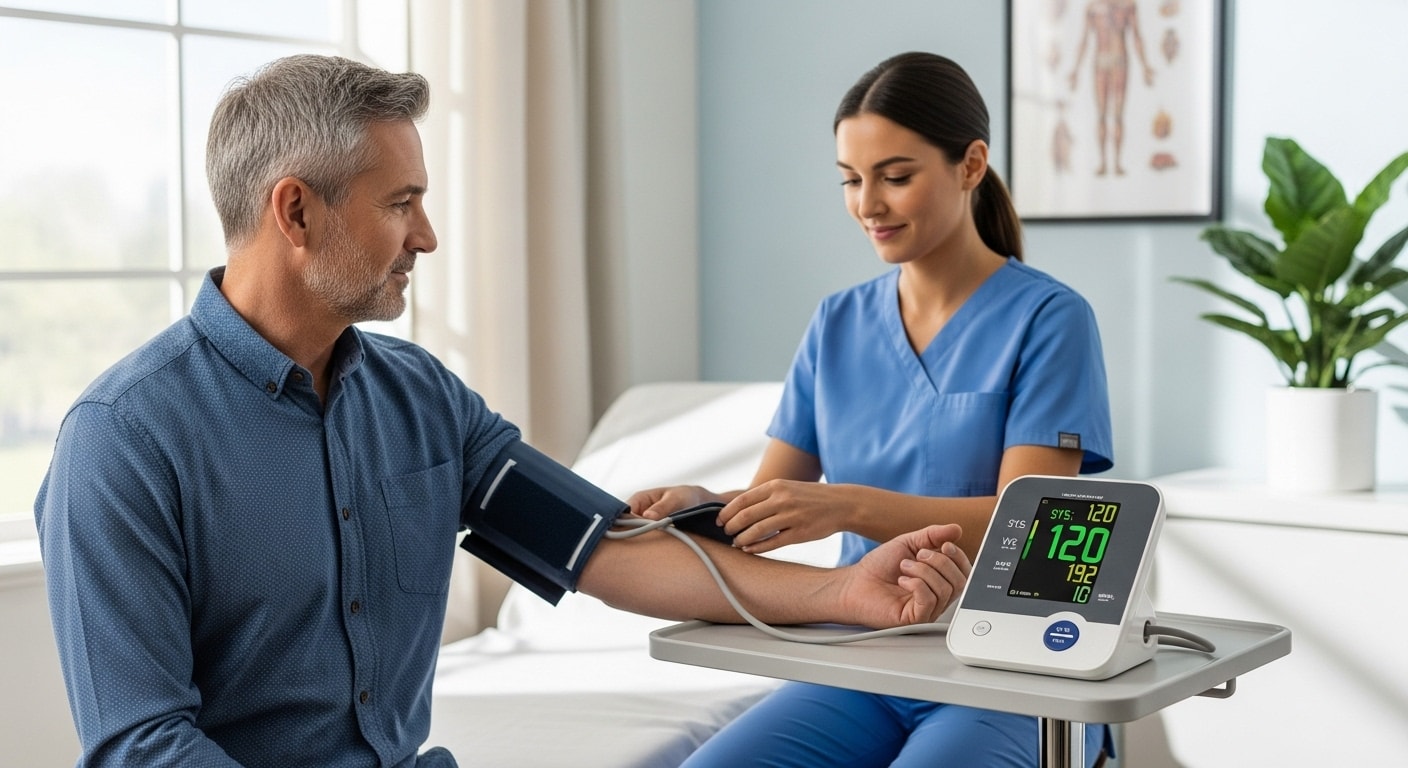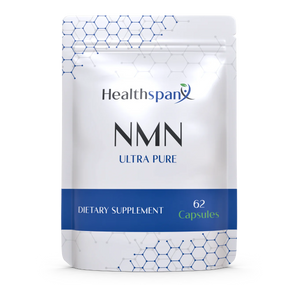Does NMN Reduce Blood Pressure? Clinical Insights & Studies | HealthspanX

Does NMN Reduce Blood Pressure? | NMN's Regulation Of Blood Flow
Clinical trials now confirm that nicotinamide mononucleotide (NMN) can significantly lower blood pressure in adults with hypertension by restoring NAD+ levels and improving vascular function.
NMN is best known as a longevity molecule, but emerging evidence suggests it may also offer therapeutic benefits for people dealing with cardiovascular issues like high blood pressure, which is increasingly recognized as an aging related disease due to its association with age-related decline in NAD+ levels.
In addition to its general therapeutic benefits, NMN has shown potential to alleviate hypertension, making it a promising option for managing age-related hypertension.
NMN is also being explored as a vascular aging targeted intervention, as NAD+ augmentation strategies like NMN supplementation may help counteract vascular aging and related hypertension.
Let’s take a look at what science has to say.
What Is NMN And Why Might It Affect Blood Pressure?
NMN is a molecule that increases NAD+ levels in your cells, which improves blood vessel function, energy metabolism, and cellular repair—making it potentially useful for reducing high blood pressure. NMN may also help address metabolic dysfunction, which is often associated with aging and hypertension.
As we age, NAD+ levels naturally decline. NAD+ levels in blood cells also decrease with age and hypertension, but NMN supplementation can restore NAD+ in blood cells. Fortunately, studies have shown that NMN supplementation improves NAD+ levels in aging individuals.
Mechanisms of NMN In Blood Pressure Regulation

NMN supplementation plays a multifaceted role in blood pressure regulation, offering promising benefits for individuals with high blood pressure and those at risk of cardiovascular diseases. At the core of NMN’s effects is its ability to elevate nicotinamide adenine dinucleotide (NAD+) levels within the body. NAD+ is essential for cellular energy production and repair, but it also has a direct impact on the cardiovascular system.
NMN supplementation has also been shown to improve vascular function by reducing arterial stiffness—a key factor in blood pressure elevation, especially among middle-aged and older adults. Stiff arteries force the heart to work harder, raising blood pressure levels and increasing the risk of cardiovascular events. By ameliorating vascular dysfunction and supporting more flexible blood vessels, NMN helps to lower blood pressure and protect against vascular aging.
Another important mechanism involves NMN’s anti-inflammatory properties. Chronic inflammation in blood vessels can lead to vascular damage and contribute to the development of hypertension and other cardiovascular diseases. NMN helps to regulate immune cells, such as peripheral blood mononuclear cells, reducing inflammation and supporting healthier blood vessels. This not only aids in lowering blood pressure but also improves overall cardiovascular health.
Can NMN Reduce Systolic Blood Pressure In People With High Blood Pressure?
Yes. In a clinical trial, 800 mg/day of NMN for six weeks significantly lowered systolic blood pressure in hypertensive adults compared to lifestyle changes alone, with a significant difference observed between the NMN and control groups.
A 2023 randomized controlled trial from Sun Yat-sen University investigated the effects of NMN on 19 adults with mild hypertension. Participants were split into two groups. One group received 800 mg of oral NMN daily for six weeks along with lifestyle modifications (low-salt diet and regular exercise). The other group (control group) followed lifestyle changes only.
Compared to the control group, the NMN group experienced a significant reduction in systolic blood pressure. Systolic blood pressure is the upper number in a blood pressure reading.
Importantly, NMN also increased blood NAD+ levels by approximately 43%. This significant increase in NAD+ was accompanied by significant changes in metabolic markers, highlighting the enhanced effect of NMN supplementation. The study measured NAD+ levels in blood cells, which are a key biomarker in hypertension and vascular health research. The endothelial function of the NMN group was also improved. Endothelial function refers to the various processes performed by your blood vessels. Usually, when there’s endothelial dysfunction, it may cause hypertension.
Therefore, an improvement in endothelial function in response to NMN supplementation is a very promising result. The present study found ameliorated vascular dysfunction and improved vascular dysfunction in the NMN group. This suggests that there may be a strong mechanistic link between NAD+ restoration and blood pressure reduction. The results suggest that NMN supplementation can beneficially impact blood pressure and vascular health, while results suggested that decreased NAD+ levels may be involved in the modulation of hypertension and vascular dysfunction.
Mechanistically, the endothelial wall affects blood pressure regulation through changes in NAD+ levels, and blood cells serve as an important biomarker in this process.
Based on these findings, there is potential to treat patients with NMN as a novel therapeutic strategy for hypertension and vascular dysfunction.
Does NMN Lower Diastolic Blood Pressure Too?
Yes, clinical evidence shows that NMN significantly lowers diastolic blood pressure in overweight adults.
In a randomized, human trial conducted by Harvard researchers, overweight and obese adults were given a daily oral dose of 2,000 mg of NMN for 28 days.
At the end of the study, people who received NMN had a significantly lower diastolic blood pressure compared to the people who received a placebo. Diastolic blood pressure (DBP) measures the pressure in your arteries when your heart rests between beats. During this phase, blood fills the heart, and NMN supplementation can help optimize this process by reducing DBP, which is beneficial for cardiovascular health.
Elevated DBP is associated with greater vascular resistance and increased cardiovascular risk. By reducing DBP, NMN may help ease the strain on your blood vessels which could potentially lower the risk of heart disease and stroke over time. NMN improves heart function by reducing diastolic blood pressure, further supporting its cardiovascular benefits.'
Importantly, the study also confirmed that NMN was well tolerated. No adverse effects were reported across the 28-day period, supporting its short-term safety profile at higher doses.
The trial also found that the NMN group had reductions in body weight and LDL cholesterol. NMN reduces body weight and total cholesterol, suggesting it might play a broader role in the metabolic health of an individual.
What Happens to NAD+ In Hypertension?
Hypertension is a chronic illness that is linked to inflammation. Due to inflammation, the levels of CD38 enzyme rise in blood vessels. This enzyme degrades NAD+. In hypertensive patients, NAD+ levels in blood cells are significantly reduced, making blood cells a key biomarker for vascular health.
Here’s how it works:
-
Inflammation triggers macrophages to move into blood vessels. Macrophages are your body’s soldiers.
-
In the blood vessels, macrophages produce IL-1β. This is a molecule that causes an increase in the CD38 levels.
-
The higher CD38 levels lead to more NAD+ degradation, and changes in NAD+ within the arterial wall directly participated in blood pressure regulation.
NAD+ depletion can also contribute to metabolic dysfunction, further impacting overall health.
Can NMN Raise Blood Pressure Instead?
No. Human trials show NMN does not raise blood pressure, even at high doses. It is well tolerated and considered safe.
In human studies, NMN did NOT increase blood pressure. Even at high doses (2,000 mg/day), participants experienced no rise in either systolic or diastolic readings.
That said, no long-term trials yet exist to assess the effects over several months or years—especially in people on blood pressure medications.
If you take antihypertensive drugs, consult your physician before adding NMN to your regimen, as it may enhance or repress the effects of medications.
Who Might Benefit Most From NMN For Blood Pressure?
Adults with mild hypertension, low NAD+ levels, or age-related vascular decline may benefit most from NMN supplementation.
Ideal candidates include:
-
Adults with early-stage hypertension not yet on medication.
-
Individuals with low energy.
While NMN is not a replacement for antihypertensive drugs, it may complement lifestyle changes and offer preventive support.
What Is The Best Dose Of NMN For Blood Pressure Support?
Studies suggest 250–800 mg/day is effective and safe for supporting blood pressure, with 800 mg showing measurable reductions in hypertensive adults. However, you may need up to 2,000 mg/day to cause a significant decrease in diastolic blood pressure.
-
800 mg/day: Lowers systolic pressure in patients with hypertension, as demonstrated by the study mentioned above.
-
2,000 mg/day: Lowers diastolic blood pressure in obese or overweight participants. This was the dose used by the study coming out of Harvard. It is effective but expensive and not widely adopted.
Final Thoughts: Does NMN Reduce Blood Pressure?
Studies show NMN lowers both systolic and diastolic blood pressure. It also restores NAD+ levels and seems to improve vascular function. This makes it a promising natural tool for managing hypertension.
Clinical trials have demonstrated significant differences in blood pressure levels among hypertensive patients receiving NMN supplementation. These studies also report improvements in blood cholesterol levels, including reductions in low-density lipoprotein (LDL) cholesterol, which further lowers cardiovascular risk. Additionally, NMN has shown benefits for metabolic health, such as improved muscle insulin sensitivity and reduced body weight, particularly in overweight or obese adults.
Safety assessments from these clinical trials indicate that NMN is well-tolerated, with no significant adverse events reported. As a promising therapeutic measure, NMN may offer a valuable strategy for managing high blood pressure, improving vascular function, and reducing the risk of age-related diseases and metabolic disorders.
While current evidence is encouraging, further clinical trials are needed to fully understand the long-term effects of NMN supplementation on blood pressure regulation and cardiovascular health. For now, NMN stands out as a promising clinical strategy for supporting healthy blood pressure and protecting the cardiovascular system, especially in populations at higher risk for hypertension and vascular dysfunction.
For adults with high blood pressure or declining vascular health, NMN offers a science-backed strategy to improve endothelial function, reduce arterial stiffness, and restore balance to the aging cardiovascular system.
If you are serious about supporting your blood pressure and overall heart health, NMN may be worth considering. However, it's important to get the purest NMN available because impure formulations may not have therapeutic efficacy. Shop Ultra Pure NMN™ from HealthspanX!
References
- Yamane, T., Imai, M., Bamba, T., & Uchiyama, S. (2023). Nicotinamide mononucleotide (NMN) intake increases plasma NMN and insulin levels in healthy subjects. Clinical nutrition ESPEN, 56, 83–86. https://doi.org/10.1016/j.clnesp.2023.04.031
- Qiu, Y., Xu, S., Chen, X., Wu, X., Zhou, Z., Zhang, J., Tu, Q., Dong, B., Liu, Z., He, J., Zhang, X., Liu, S., Su, C., Huang, H., Xia, W., & Tao, J. (2023). NAD+ exhaustion by CD38 upregulation contributes to blood pressure elevation and vascular damage in hypertension. Signal transduction and targeted therapy, 8(1), 353. https://doi.org/10.1038/s41392-023-01577-3
- Gallo, G., Volpe, M., & Savoia, C. (2022). Endothelial Dysfunction in Hypertension: Current Concepts and Clinical Implications. Frontiers in medicine, 8, 798958. https://doi.org/10.3389/fmed.2021.798958
- Pencina, K. M., Valderrabano, R., Wipper, B., Orkaby, A. R., Reid, K. F., Storer, T., Lin, A. P., Merugumala, S., Wilson, L., Latham, N., Ghattas-Puylara, C., Ozimek, N. E., Cheng, M., Bhargava, A., Memish-Beleva, Y., Lawney, B., Lavu, S., Swain, P. M., Apte, R. S., Sinclair, D. A., … Bhasin, S. (2023). Nicotinamide Adenine Dinucleotide Augmentation in Overweight or Obese Middle-Aged and Older Adults: A Physiologic Study. The Journal of clinical endocrinology and metabolism, 108(8), 1968–1980. https://doi.org/10.1210/clinem/dgad027
- Yano, Y., Kim, H. C., Lee, H., Azahar, N., Ahmed, S., Kitaoka, K., Kaneko, H., Kawai, F., Mizuno, A., & Viera, A. J. (2022). Isolated Diastolic Hypertension and Risk of Cardiovascular Disease: Controversies in Hypertension - Pro Side of the Argument. Hypertension (Dallas, Tex. : 1979), 79(8), 1563–1570. https://doi.org/10.1161/HYPERTENSIONAHA.122.18459
- Katayoshi, T., Uehata, S., Nakashima, N., Nakajo, T., Kitajima, N., Kageyama, M., & Tsuji-Naito, K. (2023). Nicotinamide adenine dinucleotide metabolism and arterial stiffness after long-term nicotinamide mononucleotide supplementation: a randomized, double-blind, placebo-controlled trial. Scientific reports, 13(1), 2786. https://doi.org/10.1038/s41598-023-29787-3
- Patrick, D. M., Van Beusecum, J. P., & Kirabo, A. (2021). The role of inflammation in hypertension: novel concepts. Current opinion in physiology, 19, 92–98. https://doi.org/10.1016/j.cophys.2020.09.016


